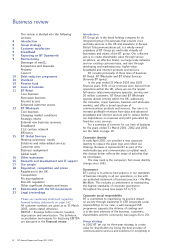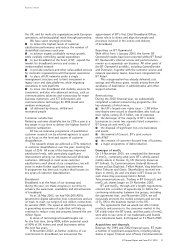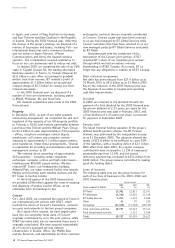BT 2003 Annual Report Download - page 19
Download and view the complete annual report
Please find page 19 of the 2003 BT annual report below. You can navigate through the pages in the report by either clicking on the pages listed below, or by using the keyword search tool below to find specific information within the annual report.Business review
18 BT Annual Report and Form 20-F 2003
Other options include alternative attendance patterns,
maternity, paternity, adoptive and parental leave,
career breaks and an increasingly flexible approach to
assist individuals to prepare for their retirement age.
Industrial relations
An estimated 75% of our UK employees belong to one
of two main trade unions recognised by the company.
We have a good record of industrial relations and
constructive, occasionally robust relationships, based
on partnership and mutual respect, with both unions
in the UK and works councils elsewhere across Europe.
Equal opportunities
We are an equal opportunities employer and are
committed to developing a working culture that
enables all employees to make their own distinctive
contribution. We are an active member of many equal
opportunity and diversity organisations, and during
the year were awarded the platinum standard by
Opportunity Now for our work on gender equality and
the gold standard by Race for Opportunity (RfO) for
our work on race equality.
We were also recognised by the Employers’ Forum
on Disability for our leadership in the employment of
people with disabilities.
Our Chief Executive, Ben Verwaayen, is chairman
of the National Employment Panel’s Steering Group on
Lone Parents, which aims to create more opportunities
for lone parents to work.
Regulation, competition and prices
The commercial environment in the UK and in the
countries in which BT operates or wishes to operate
is increasingly competitive and dynamic. However,
we remain subject to extensive regulation, particularly
in the UK, which can materially affect the way in which
we carry out our business. We also use inputs from
other regulated operators, largely outside the UK,
and the availability and price of these inputs may
change from time to time, impacting on our business.
Regulation in the UK
The regulatory structure for UK telecommunications
is set out principally in the Telecommunications Act
1984, which gives regulatory authority to the Secretary
of State for Trade and Industry and the Director
General of Telecommunications who heads the Office
of Telecommunications (Oftel). The Secretary of State
and the Director General are each required to exercise
their functions under the Act in the way which they
consider is best calculated to ensure, as far as
reasonably practical, that all reasonable demand for
telecommunication services, including certain
community services, is met, and to secure the ability
of licensed telecommunications operators to finance
the provision of the services which they are licensed
to provide. In addition, they are required, among
other things, to promote the interests of consumers,
purchasers and other users in the prices, variety and
quality of telecommunication services and equipment,
and to promote and maintain efficiency and effective
competition among UK telecommunications operators.
With limited exceptions, a licence under the
Telecommunications Act is required to run a
telecommunication system in the UK. The Secretary
of State is responsible for issuing licences after
consulting the Director General. The regulatory regime
will change during 2003 and a new regulator, Ofcom,
will take over – see sections ‘‘The BT Licence’’, ‘‘New
European Union Directives’’ and ‘‘Communications Bill
and Ofcom’’ for further information.
The BT Licence
BT currently operates in the UK under a number of
licences, the most important of which is our licence
to operate our fixed-line public telecommunications
network (the ‘‘Licence’’). Subject to the
implementation of the new European Union Directives
(see below), the Licence remains in force indefinitely,
but the Secretary of State may revoke the Licence on
ten years’ notice. The Licence can also be revoked at
any time on various grounds, including non-compliance
with an enforcement order from the Director General.
In September 1999, the Licence was modified to meet
the harmonisation requirements of the European Union
Licensing Directive.
The Licence contains terms and conditions
designed principally to ensure the widespread provision
of telecommunication services in the UK, to protect
the interests of consumers and to encourage the
development of effective competition in
telecommunication services and network provision
within the UK.
Under the Licence, we have to fulfil reasonable
requests for voice telephony, low-speed data and fax
transmission services, and provide public call boxes
in accordance with published guidelines, throughout
nearly all the UK, including rural areas (these being the
principal elements of the Universal Service Obligation).
Under the Licence, we must allow other licensed
operators to interconnect with our telecommunications
systems on cost-oriented, transparent and non-
discriminatory terms.
We must comply with a variety of fair trading
obligations, such as:
&a prohibition on showing undue discrimination
between customers or unfairly favouring any part of
our own business as against competitors in relation
to matters such as the price, terms and conditions
or quality of our main services; and
&a prohibition on the unfair cross-subsidy of certain
of our activities.
We must publish audited financial statements for
the regulated ‘‘businesses’’ and ‘‘activities’’, in order
to support the linkage of costs with interconnect prices
and with a view to providing demonstrable evidence
that we are neither behaving in a discriminatory fashion
nor unfairly subsidising our activities. If it appears to
the Director General that an unfair cross-subsidy exists
between specified parts of our own business, we must
take such steps as the Director General may direct to
remedy the situation. The regulatory businesses for
which separated accounts are currently produced are
retail narrowband access, apparatus supply, network,
retail systems, mobile, supplemental services and
























